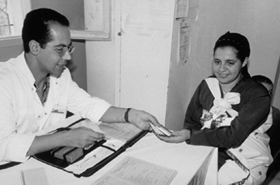|
|
 Previous Chapter Previous Chapter  Previous Page Next Page Previous Page Next Page  Next Chapter Next Chapter 
Helping Continuing Users
- Ask how the client is doing with the method and whether she is satisfied. Ask if she has any questions or anything to discuss.
- Ask especially if she is concerned about bleeding changes. Give her any information or help that she needs (see Managing Any Problems).
- Ask if she often has problems remembering to take a pill every day. If so, discuss ways to remember, making up for missed pills, and ECPs, or choosing another method.
- Give her more pill packs—as much as a full year’s supply (11 or 13 packs), if possible. Plan her next resupply visit before she will need more pills.
- Ask a long-term client if she has had any new health problems since her last visit. Address problems as appropriate. For new health problems that may require switching methods.
- Ask a long-term client about major life changes that may affect her needs—particularly plans for having children and STI/HIV risk. Follow up as needed.

Managing Any Problems
Problems Reported as Side Effects or Problems With Use
May or may not be due to the method.
- Problems with side effects affect women’s satisfaction and use of POPs. They deserve the provider’s attention. If the client reports side effects or problems, listen to her concerns, give her advice, and, if appropriate, treat.
- Encourage her to keep taking a pill every day even if she has side effects. Missing pills can risk pregnancy.
- Many side effects will subside after a few months of use. For a woman whose side effects persist, give her a different POP formulation, if available, for at least 3 months.
- Offer to help the client choose another method—now, if she wishes, or if problems cannot be overcome.
No monthly bleeding
- Breastfeeding women:
- Reassure her that this is normal during breastfeeding. It is not harmful.
- Women not breastfeeding:
- Reassure her that some women using POPs stop having monthly bleeding, and this is not harmful. There is no need to lose blood every month. It is similar to not having monthly bleeding during pregnancy. She is not infertile. Blood is not building up inside her. (Some women are happy to be free from monthly bleeding.)
Irregular bleeding (bleeding at unexpected times that bothers the client)
- Reassure her that many women using POPs experience irregular bleeding—whether breastfeeding or not. (Breastfeeding itself also can cause irregular bleeding.) It is not harmful and sometimes becomes less or stops after the first several months of use. Some women have irregular bleeding the entire time they are taking POPs, however.
- Other possible causes of irregular bleeding include:
- To reduce irregular bleeding:
- Teach her to make up for missed pills properly, including after vomiting or diarrhea (see Managing Missed Pills).
- For modest short-term relief she can try 800 mg ibuprofen 3 times daily after meals for 5 days or other nonsteroidal anti-inflammatory drug (NSAID), beginning when irregular bleeding starts. NSAIDs provide some relief of irregular bleeding for implants, progestin-only injectables, and IUDs, and they may also help POP users.
- If she has been taking the pills for more than a few months and NSAIDs do not help, give her a different POP formulation, if available. Ask her to try the new pills for at least 3 months.
- If irregular bleeding continues or starts after several months of normal or no monthly bleeding, or you suspect that something may be wrong for other reasons, consider underlying conditions unrelated to method use (see Unexplained vaginal bleeding).
Heavy or prolonged bleeding (twice as much as usual or longer than 8 days)
- Reassure her that some women using POPs experience heavy or prolonged bleeding. It is generally not harmful and usually becomes less or stops after a few months.
- For modest short-term relief she can try NSAIDs, beginning when heavy bleeding starts. Try the same treatments as for irregular bleeding.
- To help prevent anemia, suggest she take iron tablets and tell her it is important to eat foods containing iron, such as meat and poultry (especially beef and chicken liver), fish, green leafy vegetables, and legumes (beans, bean curd, lentils, and peas).
- If heavy or prolonged bleeding continues or starts after several months of normal or no monthly bleeding, or you suspect that something may be wrong for other reasons, consider underlying conditions unrelated to method use (see Unexplained vaginal bleeding).
Missed pills
Ordinary headaches (nonmigrainous)
- Suggest aspirin (325–650 mg), ibuprofen (200–400 mg), paracetamol (325–1000 mg), or other pain reliever.
- Any headaches that get worse or occur more often during POP use should be evaluated.
Mood changes or changes in sex drive
- Ask about changes in her life that could affect her mood or sex drive, including changes in her relationship with her partner. Give her support as appropriate.
- Some women experience depression in the year after giving birth. This is not related to POPs. Clients who have serious mood changes such as major depression should be referred for care.
- Consider locally available remedies.
Breast tenderness
- Breastfeeding women:
- Women not breastfeeding:
- Recommend that she wear a supportive bra (including during strenuous activity and sleep).
- Try hot or cold compresses.
- Suggest aspirin (325–650 mg), ibuprofen (200–400 mg), paracetamol (325–1000 mg), or other pain reliever.
- Consider locally available remedies.
Severe pain in lower abdomen
- Abdominal pain may be due to various problems, such as enlarged ovarian follicles or cysts.
- A woman can continue to use POPs during evaluation and treatment.
- There is no need to treat enlarged ovarian follicles or cysts unless they grow abnormally large, twist, or burst. Reassure the client that they usually disappear on their own. To be sure the problem is resolving, see the client again in 6 weeks, if possible.
- With severe abdominal pain, be particularly alert for additional signs or symptoms of ectopic pregnancy, which is rare and not caused by POPs, but it can be life-threatening (see p. 44, Question 12).
- In the early stages of ectopic pregnancy, symptoms may be absent or mild, but eventually they will become severe. A combination of these signs or symptoms should increase suspicion of ectopic pregnancy:
- Unusual abdominal pain or tenderness
- Abnormal vaginal bleeding or no monthly bleeding—especially if this is a change from her usual bleeding pattern
- Light-headedness or dizziness
- Fainting
- If ectopic pregnancy or other serious health condition is suspected, refer at once for immediate diagnosis and care. (See Female Sterilization, Managing Ectopic Pregnancy, p. 179, for more on ectopic pregnancies.)
Nausea or dizziness
- For nausea, suggest taking POPs at bedtime or with food.
- If symptoms continue, consider locally available remedies.
 Previous Chapter Previous Chapter  Previous Page Next Page Previous Page Next Page  Next Chapter Next Chapter 
|


 Previous Chapter
Previous Chapter Previous Page
Previous Page

